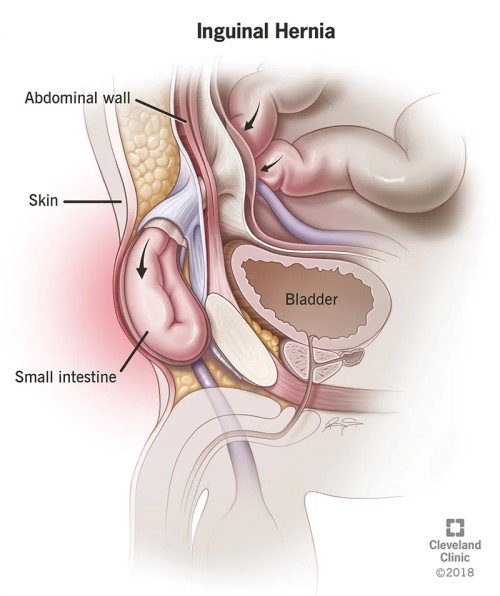
An inguinal hernia occurs when tissue, such as part of the intestine, protrudes through a weak point or tear in the lower abdominal muscles. This can cause pain, discomfort, and potentially life-threatening complications if not treated. In this blog post, we will discuss the symptoms, diagnostics, and operation options for inguinal hernias.
Symptoms of Inguinal Hernias:
Inguinal hernias can present with a variety of symptoms, including:
- Bulging or swelling in the groin or scrotum. A bulging or swelling in the groin or scrotum can be a symptom of an inguinal hernia. This occurs when tissue, such as part of the intestine, protrudes through a weak point or tear in the lower abdominal muscles and pushes into the groin or scrotum area, causing a noticeable bulge or swelling. This bulge may be more prominent when standing or coughing and can often be pushed back into the abdomen when lying down. If you are experiencing a bulging or swelling in the groin or scrotum, it is important to see your doctor for a proper diagnosis and treatment plan.
- Pain or discomfort in the groin or lower abdomen. Pain or discomfort in the groin or lower abdomen can be a symptom of an inguinal hernia. This occurs because the protruding tissue puts pressure on the surrounding muscles and nerves, causing pain or discomfort in the affected area. The pain may be more noticeable when standing, coughing, or lifting heavy objects, and may be relieved when lying down. If you are experiencing pain or discomfort in the groin or lower abdomen, it is important to see your doctor for a proper diagnosis and treatment plan.
- A feeling of heaviness or pressure in the groin. A feeling of heaviness or pressure in the groin can be a symptom of an inguinal hernia. This occurs because the protruding tissue puts pressure on the surrounding muscles and nerves, causing a sensation of heaviness or pressure in the affected area. This feeling may be more noticeable when standing, coughing, or lifting heavy objects, and may be relieved when lying down. If you are experiencing a feeling of heaviness or pressure in the groin, it is important to see your doctor for a proper diagnosis and treatment plan.
- A burning or aching sensation in the affected area . A burning or aching sensation in the affected area can be a symptom of an inguinal hernia. This occurs because the protruding tissue can irritate or compress the surrounding nerves, causing a burning or aching sensation in the groin or scrotum. The sensation may be more noticeable when standing, coughing, or lifting heavy objects, and may be relieved when lying down. If you are experiencing a burning or aching sensation in the affected area, it is important to see your doctor for a proper diagnosis and treatment plan.
- Pain or discomfort that worsens with activity, such as bending over or lifting heavy objects . Pain or discomfort that worsens with activity, such as bending over or lifting heavy objects, can be a symptom of an inguinal hernia. This occurs because increased physical activity can put more pressure on the weak spot in the abdominal muscles and exacerbate the hernia. If you notice that your pain or discomfort worsens with activity, it is important to avoid strenuous activities and see your doctor for a proper diagnosis and treatment plan.
- Weakness or pressure in the groin area. Weakness or pressure in the groin area can be a symptom of an inguinal hernia. This occurs because the protruding tissue can put pressure on the surrounding muscles and nerves, causing weakness or a sensation of pressure in the groin or scrotum. The sensation may be more noticeable when standing, coughing, or lifting heavy objects, and may be relieved when lying down. If you are experiencing weakness or pressure in the groin area, it is important to see your doctor for a proper diagnosis and treatment plan.
- Nausea or vomiting. Nausea or vomiting is not a common symptom of an inguinal hernia. However, in some cases, a severe or untreated hernia can cause digestive symptoms such as nausea or vomiting. This can occur when the hernia is blocking or compressing the intestines, leading to digestive issues. If you are experiencing nausea or vomiting along with other symptoms of an inguinal hernia, it is important to see your doctor for a proper diagnosis and treatment plan. However, if you are experiencing only nausea or vomiting without any other symptoms of an inguinal hernia, it is unlikely that a hernia is the cause of these symptoms, and you should see your doctor for further evaluation.
Diagnostics for Inguinal Hernias:
To diagnose an inguinal hernia, your doctor will perform a physical examination of the affected area. They may also order imaging tests, such as an ultrasound or CT scan, to confirm the diagnosis.
Operation Options for Inguinal Hernias:
Surgery is the only effective treatment for inguinal hernias. There are two main types of surgery for inguinal hernias: open hernia repair and laparoscopic hernia repair.
Open hernia repair involves making a single incision in the groin area and pushing the protruding tissue back into place. The weakened muscle is then reinforced with mesh to prevent the hernia from recurring.
Laparoscopic hernia repair involves making several small incisions in the abdomen and using a laparoscope (a thin, lighted tube with a camera on the end) to repair the hernia. The hernia is repaired with mesh, and the incisions are closed with stitches.
Both types of surgery are generally safe and effective. Your doctor will discuss the pros and cons of each option with you and help you make an informed decision.
In conclusion, inguinal hernias can cause discomfort and potentially life-threatening complications if left untreated. If you are experiencing symptoms of an inguinal hernia, it is important to see your doctor for a proper diagnosis and treatment plan. Surgery is the most effective treatment for inguinal hernias, and your doctor can help you decide which type of surgery is best for you.








